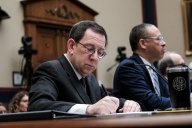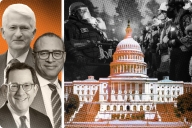You have /5 articles left.
Sign up for a free account or log in.
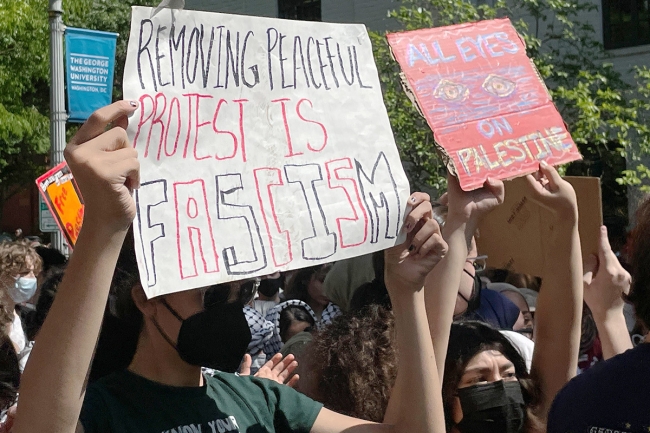
A Congressional hearing over D.C.’s inaction in clearing an encampment at George Washington was canceled after police changed course and swept the site, arresting 33.
Josh Moody/Inside Higher Ed
Police swept a pro-Palestinian encampment at George Washington University and arrested 33 demonstrators early Wednesday morning, the 14th day of the protest. The action came less than 12 hours before District of Columbia Mayor Muriel Bowser was set to face Congress over her administration’s earlier decision not to clear the encampment at the request of GW officials.
The hearing was subsequently canceled, averting a showdown between DC’s Democratic mayor and Republican officials who have criticized Bowser for failing to act on April 26, when GW asked for help. City officials reportedly declined over concerns about the optics of removing a small group of peaceful protesters.
GW’s protest, like dozens of others at campuses across the country, sought to bring attention to the deadly war between Israel and Hamas, which has caused tens of thousands of civilian casualties. Pro-Palestinian protesters have demanded that GW disclose any endowment funds invested in companies that profit from war or do business with the Israeli government, and immediately divest from those entities.
Now the protest site, which hosted teach-ins, guest lectures, and musical performances over the course of nearly two weeks, has been cleared of the more than 100 tents that once sprawled across University Yard and onto a nearby public street, leaving behind dead grass, graffiti and questions about the role Congress ultimately played in unwinding the encampment.
A Sudden Sweep
In a press conference Wednesday morning, Bowser and Metropolitan Police Department officials said they took action because of heightened concerns about the protest site.
“Since the start of the encampment on GW’s campus on April 25, the Metropolitan Police Department has supported GW in assessing and monitoring the First Amendment activities,” MPD police chief Pamela Smith said. “They began very peaceful. But over the past few days, we began to see an escalation in the volatility of the protests at GW.”
Specifically, MPD officials pointed to a campus police officer who was shoved by a protester last week, the report of an alleged assault at the site, and the arrival of students from other institutions—including Columbia University— who joined the encampment. MPD officials also alleged that protesters were gathering “items that could potentially be used for offensive and defensive weapons,” but did not specify details at the press conference or in response to questions from Inside Higher Ed.
MPD officials also said that protesters were reportedly “probing” buildings for future protests.
In all, 33 individuals were arrested Wednesday. Of those, 30 were apprehended at the encampment site; the other three, who arrived during the sweep, were arrested for allegedly trying to push past barricades established by MPD, which used pepper spray to detain demonstrators.
While most of the arrests were for unlawful entry, one was for assault of a police officer.
As a result of the sweep, Kentucky representative James Comer, the top ranking Republican on the House Oversight Committee, announced the hearing scheduled for that afternoon was off.
“It was unfortunate the situation at GW forced the Oversight Committee to act; however it was apparent that the DC police force was not going to do their job,” Comer said Wednesday morning. “Therefore, after meeting with GW leadership and touring the encampment, we decided to hold a public hearing to get answers as to why the Mayor would not uphold the law. I am pleased that the potential Oversight hearing led to swift action by Mayor Bowser and MPD Chief Smith. We will continue to hold D.C. officials accountable to ensure our nation’s capital is safe for all.”
Comer, who has called the pro-Palestinian encampment at GWU “unlawful and antisemitic,” was one of several Congressional Republicans to visit the protest site since it sprang up in late April. He was joined by fellow House Republicans Lauren Boebert of Colorado, and Byron Donalds and Anna Paulina Luna of Florida. Following a meeting with GW officials, the Congress members toured the encampment, calling on Bowser to clear the site immediately.
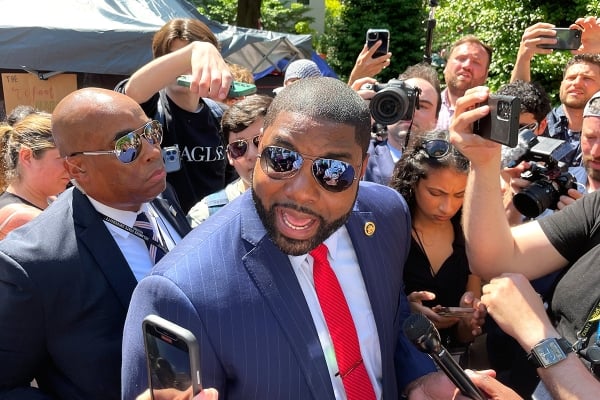
Representative Byron Donalds was one of several Congressional Republicans to tour the GW encampment.
Josh Moody/Inside Higher Ed
Asked if Bowser swept the encampment to appease Congress before Wednesday’s scheduled hearing, a spokesperson simply said, “No” and referred Inside Higher Ed to the press conference.
“Congressman Comer indicated that he thought our energies today should be on our ongoing operations. I agree,” Bowser said Wednesday morning before the hearing was officially canceled, noting that she expected it would be called off in light of the MPD’s late night action.
Other Republican officials, however, expressed displeasure with Bowser’s hesitancy.
“It shouldn’t have taken the threat of a Congressional hearing for DC Mayor Bowser to finally allow DC Police to respond to George Washington University’s call for them to clear the anti-Semitic and unlawful encampments. It should’ve been done on Day 1,” Louisiana Republican Steve Scalise wrote in a social media post on Wednesday.
GW’s Response
In a press conference at the encampment Tuesday, student protesters told reporters that they intended to remain at the site through summer if no agreement could be reached with GW officials, whom they accused of negotiating in bad faith and not listening to their divestment concerns.
“It is shameful that the university is more willing to speak with Congress, to the mayor, to the police than to speak with us, as their own student body,” one protester said Tuesday afternoon.
Despite the protesters’ proclamations, the encampment was gone less than 24 hours later.
The sweep of the site came amid rising tensions between protesters and GW leaders, who began using more pointed language in the days before the encampment was torn down. For the first time, President Ellen Granberg declared the protest illegal in a Sunday statement, arguing that GW was “not equipped to single-handedly manage an unprecedented situation such as this.”
“The demonstration, like many around the country, has grown into what can only be classified as an illegal and potentially dangerous occupation of GW property,” Granberg wrote.
While her statement stopped short of directly requesting assistance from DC police in clearing the encampment, it emphasized that the university was incapable of removing protesters alone, likely adding to the mounting pressure—amplified by Congress—for city officials to take action.
Six hours before the sweep, demonstrators outside the president’s on-campus residence chanted phrases including, “Granberg, Granberg, you’re a tyrant, we will never be silent!” according to video posted online.
By early Wednesday, university maintenance crews were loading tents into a garbage truck. Officials had covered up a statue of George Washington—previously covered in a keffiyeh, Palestinian flags and stickers—which bore the phrase “Genocidal Warmongering University” spray-painted on its base.
With University Yard blocked off, protesters gathered in small groups nearby. Several could be seen holding pro-Palestinian signs Wednesday afternoon.
In the aftermath of the sweep, administrators issued a statement noting that the encampment had been cleared without serious injuries; the university was operating normally and final exams would proceed as scheduled, it said. GW officials added that they were grateful for MPD’s assistance.
But some lingering questions remain, which the university has refused to address—including whether officials are investigating a public altercation between Provost Chris Bracey and a student demonstrator. Some protesters have alleged that the incident, which took place on April 29 around 1 a.m., constituted assault. Video of the altercation appears to show Bracey slapping a phone out of the hands of a protester who was filming him, in what student organizers have called an unprovoked “fit of rage.”
An Inside Higher Ed reporter on the scene did not witness the altercation. But students present alleged that Bracey had pushed a student on that raucous night, during which protesters took down barricades and stacked them in the middle of the encampment.
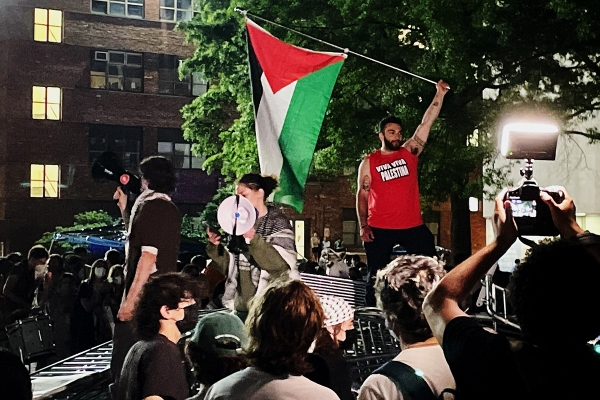
Organizers dismantled and stacked barricades meant to contain the encampment.
Josh Moody/Inside Higher Ed
“Why were you shoving that girl?” a man asked Bracey after the incident.
“I didn’t shove a girl. She was filming, so I told her, ‘You should be polite’,” Bracey responded in audio captured by Inside Higher Ed at the scene. Bracey declined further comment.
The university meanwhile has refused to discuss the incident, even as protesters and parents increasingly refer to the altercation as an “assault” and demand answers from GW administrators.
Town vs. Gown?
Bowser’s action hours before the Congressional hearing marked a sudden reversal of course. From the outside, there appeared to be no visible rise in “volatility” as DC police have alleged.
The arrest of 33 protesters at GW adds to reports of more than 2,000 detained nationwide during the latest wave of protests stemming from the Israel-Hamas war. College presidents are grappling with how to respond; some have engaged with demonstrators and agreed to consider divestment, while others have used tear gas and rubber bullets to clear encampments.
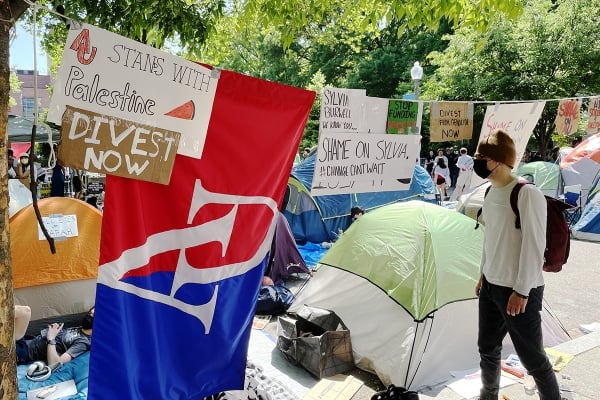
Students from nearby universities joined the GW encampment as it sprawled into the street.
Josh Moody/Inside Higher Ed
Bowser is not alone in questioning the role of local police in suppressing campus protests. Law enforcement officials have also declined to intervene elsewhere.
At the Auraria Higher Education Center in Denver—a campus shared by the Community College of Denver, Metropolitan State University of Denver, and University of Colorado at Denver—police declined to sweep an encampment of pro-Palestinian protesters for a second time, after law enforcement cleared the initial protest and made 45 arrests on April 26, according to local media reports.
Denver police chief Ron Thomas said earlier this week that he “didn’t think it was safe” or “appropriate” to dismantle the encampment a second time, according to The Denver Post. He blamed AHEC officials for leaving tents on site after the first sweep, which allowed protesters to quickly resume their occupation. Thomas also questioned whether the encampment was “an unlawful assembly.”
“We believe we can both keep our campus safe and have peaceful protests,” an Auraria spokesperson wrote by email. “As we continue to keep the students and faculty of Auraria Campus safe, Auraria Campus Police and Denver Police are in alignment with responding to the demonstrations moving forward. There is no tolerance for those who break the law, engage in any violent acts, and willingly disrupt the safety of our campus.”
Student journalists at the University of Pennsylvania reported that the Philadelphia police department had refused a request to remove a pro-Palestinian encampment on campus, ostensibly because it posed no imminent danger. According to The Philadelphia Inquirer, Penn did not formally request help in sweeping the encampment, but tensions had arisen between administrators and city officials over who should disband the protest.
Penn officials did not respond to a request for comment from Inside Higher Ed.

.jpg?itok=cjynvv9F)




